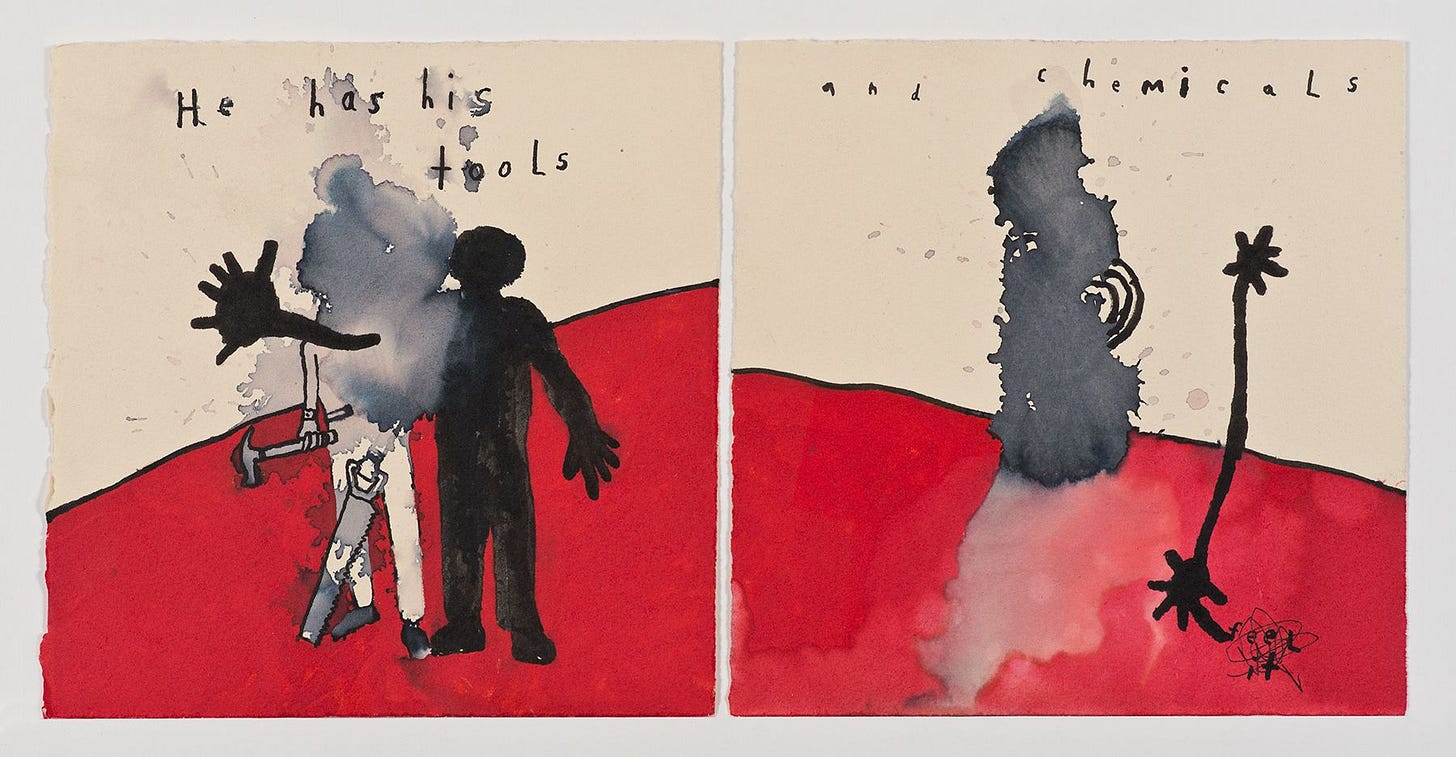WHEN WE CONFUSE THE STEP FOR THE JOURNEY - or FINDING THE ALOFOKE FRAME OF MIND
WHEN YOU CONFUSE A STEP FOR A JOURNEY, THE STEP WILL ALMOST ALWAYS LOOK LIKE FAILURE
We have an office hours question from
!I have an office hour question about the bravery required to create something that is definitely art, but doesn't have a name. I'm making something that is in between painting, video game, and interactive fiction. But it also kind of feels like a novel/short story collection and I know what it feels like and what it is, but I don't have a predecessor to pull from. The "editor" and "marketer" in my head groans at this, and I struggle with the desire to just fit what I know is understandable to the audience, but will ultimately delight me less. How do you recommend approaching creative situations like this, especially if the goal is to share it and have it be experienced- even if it is experienced in the way a small audience experiences David Lynch's or Basquiat's work for instance (outside of the "liking it because it's cool)? Thank you! Even writing out this question helps.
Dominik, thank you for your question and I’m glad the act of asking for help in itself helped — often does.
(For those who don’t know Dominik, he’s the amazing artist who drew one of the fabulous pieces I use to introduce my ongoing Gilgamek tale.)
I wish there was a supremely wise answer to your excellent question and maybe there is one, but unfortunately I don’t know it. I only know what I know, which is: you have to do the work that compels you.
Full stop.
If what you’re working on feels too weird or non-viable (whatever that might mean for you at this precise moment) then jump to something else that compels you and feels more “viable”. But if there’s no other work to jump on or if what’s really got your heart and mind is the original weirdness, then why not work on the weirdness? Why judge it against the market or against the future? Why not just be grateful that something sings to you now? No matter how weird it is or what its future is?
I’ve written before about how we often protect ourselves from the work — often hide ourselves from the depths and mysteries of our work — by focusing on shit that might seem very important to a practical mind but which are in fact trivialities to the creative mind, and which only distract us from what truly matters.
It’s important to remember that you and the work are now, right here — and there is, in fact, no promise of a future. Dealing in the now as opposed to some possible future where you have to defend the work on practical or economic grounds becomes another way to dodge what matters most — the work now. Futurity is weaponized against one’s own talents, against the only thing that makes the talent worth speaking of — what is before you now and not in some projected Muad’dib future.
Dominik, you have what sounds like an amazing project. Undefinable? Perhaps. Commodifiable? Who can know?
And as you can’t truly know, why bother trying to second guess the future?
No one can second guess the future.
As Gandalf reminds us, Even the very wise cannot see all ends.
My advice: work until you can’t work on it anymore, until it no longer calls you. And then work on something else.
That’s it. That’s all we got.
As T.S. Eliot put it (and I’m not often fond of quoting him but he said it well): For us, there is only the trying. The rest is not our business.
Quick story that approaches parable and then I’ll let you go: Ten years ago I was in one of my usual doldrums. I remember I was in Hong Kong at the time, and my latest attempt at serious fiction had unraveled. Or maybe I had just unraveled. With depression like mine one can scarcely tell.
My partner at the time was like: Don’t let it beat you. Work on anything. Try anything. Stay in the picture, by which she meant: Stay on the page.
I couldn’t bear to try anything remotely approaching literary fiction and so for no reason at all I found myself writing: Like a lot of the Great Heroes, Gilgamesh was born in a faraway time and in a faraway land.
Why was I writing about Gilgamesh? I’d read a lot about Gilgamesh when I was in graduate school — for no obvious reason, just curious. Plus: I’d never wanted to write young adult material for any reason, and yet here I was writing this.
My initial reaction: this was not the second novel I was supposed to be writing. This was not the serious work I was supposed to be producing.
I threw away those opening lines but my partner at the time was like: If that’s what you got, that’s what you got. Why not see where it takes you?
It took me a couple days of gnashing my teeth, of fighting against myself, but eventually I took that sound advice. I spent a few months tooling around those lines and hanging out with Young Gilgamesh and in the end writing fifty pages, something I called, naturally, Young Gilgamesh. It was supremely ridiculous. About Gilgamesh as a boy being unfairly punished at his school and rather than taking it deciding to beat everyone up, which he promptly does, which brings the police authorities down on him, and he beats them up too, and when the King hears about this “disorder” the King marches his soldiers against Gilgamesh and he beats them as well, until finally the Gods start getting scared and decide to send a powerful avatar to deal with him: Ms. Enkidu.
A younged-up version of the Gilgamesh epic filtered through an alofoke sensibility.


